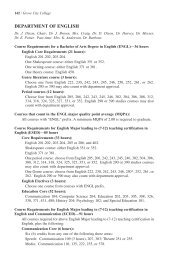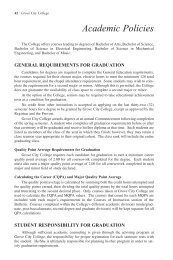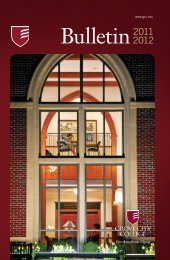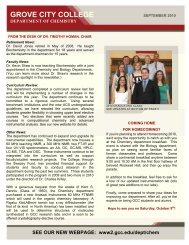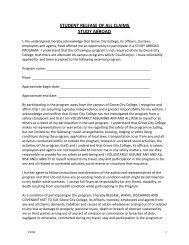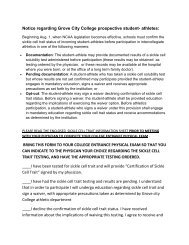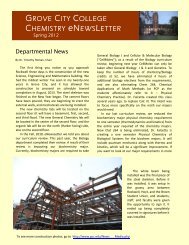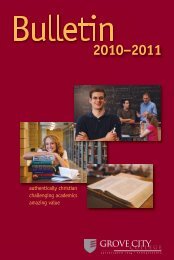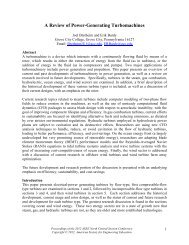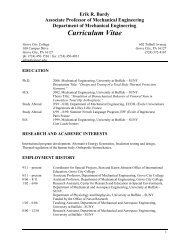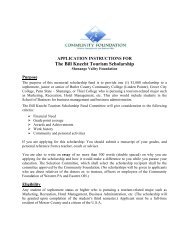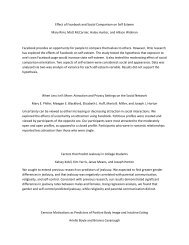2009–2010 - Grove City College
2009–2010 - Grove City College
2009–2010 - Grove City College
You also want an ePaper? Increase the reach of your titles
YUMPU automatically turns print PDFs into web optimized ePapers that Google loves.
106 / <strong>Grove</strong> <strong>City</strong> <strong>College</strong><br />
COMP 341. SYSTEMS ANALYSIS. An introduction to the application of the systems development<br />
life cycle (SDLC) as applied to a variety of practical software systems. Special emphasis is given to<br />
systems requirements determination and analysis of systems by means of team-based projects. This<br />
course fulfills the Writing Intensive (WI), Speaking Intensive (SI), and partially fulfills the Information<br />
Literacy (IL) requirements for the Computer Information Systems major. Prerequisite: Computer<br />
Science 102 or 141, and 244. Fall semester only, three hours.<br />
COMP 342. DATA COMMUNICATION AND NETWORKING. An introduction to the concepts<br />
of data communications used in information networks including equipment utilization in information<br />
networks; techniques utilized to transmit signals (e.g., modulation, multiplexing, error detection, and<br />
correction); methods of message handling; network configuration; and software utilized in implementing<br />
networks. Prerequisite: Computer Science 141. Fall semester only, three hours.<br />
COMP 360. INDEPENDENT STUDY. An advanced course for qualified students that provides an<br />
opportunity for further computer programming and analysis experience on an individual basis.<br />
Prerequisite: Permission of the department. Semester course, one, two or three hours.<br />
COMP 361. INTRODUCTION TO COMPUTER GRAPHICS. A comprehensive introduction to<br />
the field of computer graphics. Extensive programming in C++ facilitates knowledge development in<br />
the core areas, which include human perception, illumination and shading models, object representation<br />
and modeling, classical and current rendering algorithms, and the physical and mathematical foundations<br />
of the dominant models and methods. Efficient implementations of these techniques are developed<br />
from scratch in parallel with an exploration of application programming interfaces for manipulating<br />
dedicated graphics hardware. Prerequisites: Computer Science 222, Engineering 274, and<br />
Mathematics 213. Spring semester only, three hours.<br />
COMP 370. INDEPENDENT RESEARCH. An opportunity to conduct supervised research in<br />
Computer Science. Junior standing and permission of the department chair and a faculty sponsor are<br />
required. Semester course, one, two or three hours.<br />
COMP 390. SELECTED TOPICS IN COMPUTER SCIENCE. An examination of areas of computer<br />
systems not fully covered by regular departmental offerings. Subject matter varies each semester.<br />
Prerequisite: Computer Science 220 and permission of the department.<br />
Semester course, two or three hours.<br />
COMP 410. SIGNALS AND SYSTEMS. This course covers signal and system concepts, continuous<br />
and discrete Fourier analysis, sampling and reconstruction of signals, and analog and digital communication<br />
systems overview. Prerequisite: Mathematics 261. Fall semester only, three hours.<br />
COMP 411. INTRODUCTION TO SOFTWARE DEFINED RADIO. An introduction to digital<br />
communication techniques via software applications. Topics include modulation, filtering, sampling,<br />
handling nonlinearities, and adaptive techniques. Prerequisite: Computer 410.<br />
Spring semester only, three hours.<br />
COMP 422. INTRODUCTION TO ALGORITHMS. Topics include: fundamental techniques for<br />
designing efficient algorithms and basic mathematical methods for analyzing their performance; paradigms<br />
for algorithm design; divide-and-conquer, greedy methods, graph search techniques, dynamic<br />
programming; design of efficient data structures, and analysis of the running time and space requirements<br />
of algorithms in the worst and average cases. Prerequisite: Computer Science 222 and 314.<br />
Fall semester only, three hours.<br />
COMP 441. COMPUTER GAME DESIGN AND DEVELOPMENT. This course covers concepts<br />
and methods for the design and development of computer games. Topics include: graphics and animation,<br />
sprites, software design, game design, user interfaces, game development environments.<br />
Prerequisite: Computer Science 222. Alternate years, Fall semester only, three hours.<br />
COMP 442. WEB PROGRAMMING TECHNOLOGIES. This course prepares students with the<br />
fundamentals needed to program on the Internet. It offers a survey of programming concepts that yield<br />
visible or audible results in Web pages and Web-based applications. The course covers effective Webpage<br />
design, various markup languages, several scripting languages, Web servers, and databases to provide<br />
all the skills and tools needed to create dynamic Web-based applications. Prerequisite: Computer<br />
Science 244. Alternate years, spring semester only, three hours.



